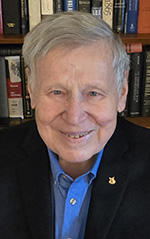Prying Open a Closed Society in Poland
Reflections
BY DICK VIRDEN
The Iron Curtain was still up and looming when my family and I lived in Warsaw in the late 1970s. The communist authorities then running the country regarded ours as a hostile embassy, so we had reason to feel like a besieged outpost.
But in fact, we were far from abandoned or without resources. A surprising number and variety of guests came to Poland during those years, enriching our diplomatic relations as well as our personal lives as described in the following series of vignettes.
 §
§
President Jimmy Carter and First Lady Rosalynn led the way. Their visit at the very end of 1977 was rich in both meaning and low comedy. It was made infamous by a translator quoting the president as “lusting after Poland in his heart.”
But high-level talks improved understanding with the Polish government while other words and gestures inspired leaders in the Roman Catholic Church, the underground media, and on the factory floor.
Within three years, an emboldened opposition would create “Solidarnosc,” the historic trade union and political movement that was born in a Gdansk shipyard and went on to rid the country of a despised regime.
At a New Year’s Eve wheels-up party the night the Carters left, we watched “Annie Hall” (courtesy of a U.S. Information Service projector and the military film circuit) and told stories about an exhausting, yet exhilarating, few days that we sensed had bent the arc of history in the right direction.
 §
§
That momentum would take off like a rocket in June 1979 during a very different sort of visit, the first return home by the Polish pontiff, Pope John Paul II. An estimated 15 million Poles—nearly half the country’s population—turned out to see him during a triumphant eight-day pilgrimage that made clear to all that the people’s fealty was to the Catholic Church and Western values, not to Moscow’s minions or doctrines.
(Before that, a delegation of Catholic bishops had come to meet with Polish church leaders, including Krakow Cardinal Karol Wojtyla, little knowing that he would soon become Pope John Paul II—and their boss!)
Not all visits were so notable. There were routine stops, for example, by Cabinet members and members of Congress (including Senators John Kerry and George McGovern as well as Representative Clement Zablocki). One of the latter distinguished himself by asking the mayor of a major Polish city whether the communists were still giving him so much trouble. The mayor’s answer was not recorded.
Stanley Frank “Stan the Man” Musial, one of baseball’s greatest players, turned up to help start the sport in his father’s homeland. And a string of world-class pianists dropped by to visit Frédéric Chopin’s ancestral home in Zelazowa Wola and perform at festivals staged in his honor.
I recall other prominent figures: writers (James A. Michener, for one), boxers, jazz musicians, scholars (Arthur Link, a historian and the leading authority on President Woodrow Wilson), filmmakers, journalists, and many others.
The list goes on.
 §
§
The visit of Dr. Myron Malkin, a senior NASA official and designer of the space shuttle, was especially memorable. He came to inaugurate Poland’s space research center and to honor Nicolaus Copernicus, the fabled Polish scientist who established five centuries ago that the Earth revolves around the sun, not vice versa.
After a sojourn to Warsaw and Copernicus’ hometown of Torun, Dr. Malkin sat down for an interview with a reporter from Voice of America (VOA). No sooner had they started to tape the interview than the VOA man’s recorder went on the blink. The radio interview was apparently doomed.
But hold on, Dr. Malkin said, let me take a look at your machine. And so he did. Quickly producing a small tool—doesn’t everyone carry one?—he tinkered a bit and soon had the equipment working again. Day saved, interview carried out, VOA’s reputation intact.
Balky tape recorders don’t normally require the expertise of a rocket scientist, but it sure was nice to have one of the best in town to do the job!


